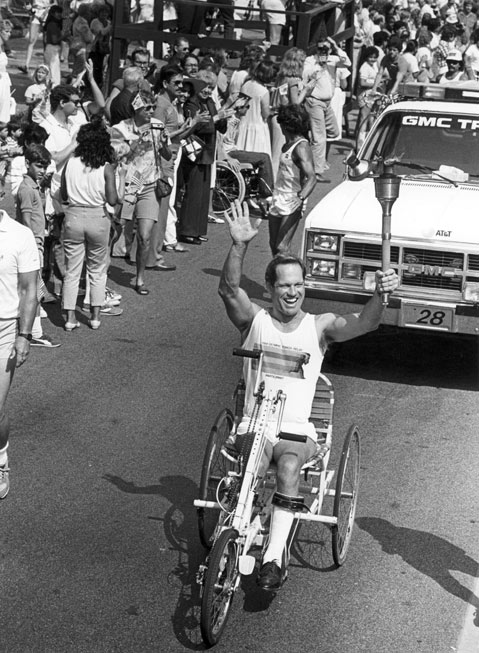William Howard Hamilton, who died at his home in Minden, Nevada, on July 15, 2014, at the age of 72, spent most of his adult life and career in Santa Barbara, where he meant many things to many people. The most startling image of Bill was seen by thousands in July 1984, when he was chosen by the Santa Barbara Traditions Committee, out of all the athletes in this very athletic community, to carry the Olympic torch through downtown Santa Barbara on its way to Los Angeles. The front page of the Los Angeles Times featured a photograph of Bill, smiling broadly and raising both arms triumphantly in the air, seated in his arm-powered wheelchair tricycle. The smile defines Bill Hamilton for anyone who knew him. If there were an Olympic event in Broad Smiling, he’d win it easily.

Bill had lost the use of his legs after an operation for a congenital spinal condition discovered while studying for his 1970 master’s degree at the University of Colorado, Boulder. His condition worsened, from walking on crutches to needing a wheelchair; for a vehicle, he chose a flashy coupe equipped with hand controls. In 1979, he earned a PhD in economics and political science at UCSB; his research included a 20-month stay in Mexico City, during which he became fluent in Spanish.
Despite being unable to dive at the start of a race or push off from the wall at turns, Bill became a swimmer to reckon with. He began training with the Santa Barbara Swim Club (SBSC) Masters shortly after Judy Mitchell became coach in 1978. Judy, now running a swim school in Australia with her husband, John Bonning, built the SBSC squad into a team that more than once won the U.S. Masters Swimming (USMS) National Championship for small swim clubs. Bill was an integral member of that team, if not its heart and soul.
In the 1979 USMS Nationals in Mission Viejo, Bill competed with able-bodied swimmers. In one heat of the 500-yard freestyle, he and one other swimmer went neck and neck and turn for turn, while a large crowd gathered to cheer Bill on to victory. He immediately ducked under the six lane lines to cross the pool and shake hands with his opponent.
In Adaptive Athletics, his star shone all the brighter, with national records in the 50-yard breaststroke and the 400 freestyle. Besides his own accomplishments, he took pride in those of his protégés. Bill was supervisor of Adaptive Programs for Santa Barbara Parks and Recreation from 1982-1989, working out of his much-visited office in the East Beach bathhouse. In that position, his assistant and successor, Mariana de Sena, recalls, he was instrumental in getting the Junior Wheelchair Summer Sports Camp started, a major youth program, which is now under the wing of Cottage Rehabilitation Hospital.
During his tenure, Adaptive Programs thrived. Bill managed the Wheelchair Sports Festival every June, the tennis tournament, and the football league’s notorious “Blister Bowl,” which sometimes pitted the wheelchair-bound team against teams of police or firefighters competing in wheelchairs. Hamilton incorporated adaptive events in Semana Nautica’s road race and racquetball tournaments and more. De Sena writes, “There are not enough words to describe all the things he accomplished to ensure the physically disabled were part of the community.”
In recognition, Bill Hamilton received the 1988 Russ Hargreaves Award from the Santa Barbara Athletic Round Table. Beyond his local activities, he served on the U.S. Swimming Association’s ad hoc committee on adaptive swimming, was a member of its technical committee, headed the master committee of the National Wheelchair Athletic Association, and was secretary of the Far West Wheelchair Athletic Association.
In 1988 Bill and Kyle Hamilton were married, and in 1990 they moved to Minden, Nevada, where Kyle began directing Adaptive Equestrian programs. Bill, far from retiring, worked for the State of Nevada’s Developmental Programs, with special concern for the hearing-impaired and shut-ins, who were vulnerable to financial scams and other abuses — “Though not on his watch,” added Kyle. He was a member of the Swimming Pool Board and helped put on Minden’s two-mile Lake Swims, which raised funds for the adaptive programs.
His prominence in that work contributed to his receiving a letter of concern from President Jimmy Carter two months before his death. President Carter’s devotion to worthwhile causes after leaving office was an inspiration to him. (Bill requested that any commemorations of his life be expressed through donations to the Carter Center: cartercenter.org.)
Many of Bill’s old teammates and friends have kept in touch and join his widow in mourning his loss while celebrating a life of extraordinary physical and intellectual accomplishments. It was Bill’s warmth and friendliness that most endeared him to all who worked and swam with him.
